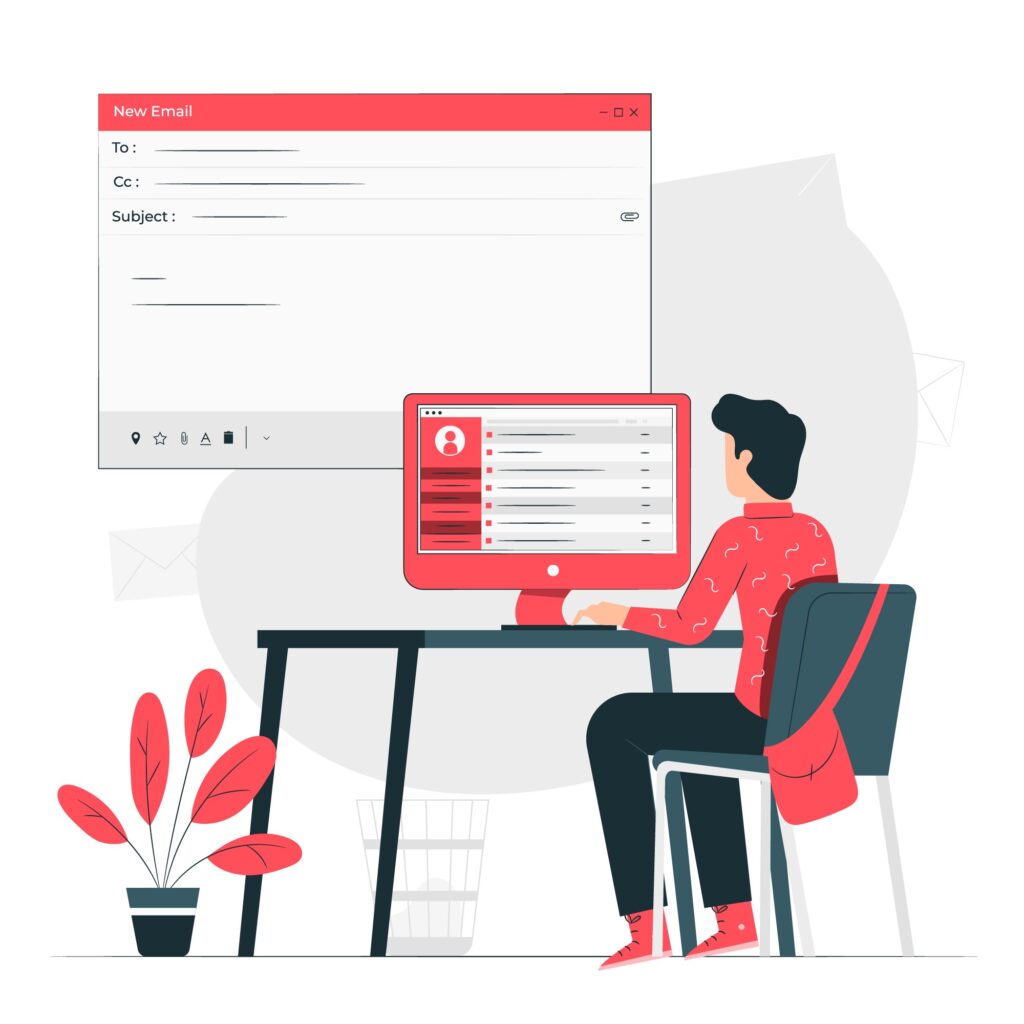Unlocking the Power of Email Marketing for Small Businesses

Small businesses struggle with finding effective marketing strategies to reach and engage with their target audience. They often face challenges in terms of brand visibility, expanding their customer base, and budget constraints.
With a strategic marketing approach, small businesses may be able to stay competitive in today’s digital world. They risk missing out on opportunities to connect with potential customers and build lasting relationships.
This ultimate guide offers valuable insights and strategies to leverage the power of email marketing for small businesses. By mastering this cost-effective and direct communication tool, small businesses can effectively reach more customers, build strong relationships, and increase their brand visibility.
In essence, email marketing is not just a strategy; it’s THE best strategy for small businesses looking to grow and thrive in the digital age.
By leveraging the power of targeted offers and compelling call-to-actions, you can get recipients from initial interest to final purchase. In this blog post, we’ll discuss the benefits of email marketing and how it can help small businesses reach more customers, build relationships, and increase their brand visibility.
What is Email Marketing?
Email marketing is a highly effective tool that allows businesses to reach out to their customers directly through email.
It is a type of digital marketing in which promotional messages or newsletters are sent to a group of individuals via email. It is a powerful tool for businesses to communicate with their customers and prospects, as well as build and nurture relationships with them.
Email marketing involves sending targeted emails to a group of individuals who have willingly subscribed to receive updates and information from your business. These emails can include promotional offers, newsletters, event invitations, and personalized content to deliver value to your subscribers.
Email marketing tools make it easier to design and deliver professional-looking emails, track the success of email campaigns, and improve overall sales. It has become one of the most popular and successful strategies for businesses of all sizes, offering a cost-effective and efficient way to engage with customers and drive growth.
With the right email marketing strategy and tools in place like email marketing software, email finders, automation tools, etc., businesses can take advantage of the power of email to elevate their brand.
Examples of email marketing applications and use cases include:
- Promotional emails: Sending discounts, special offers, or new product announcements to existing customers to encourage repeat purchases.
- Welcome emails: Send a series of automated emails to new subscribers to introduce your brand, provide value, and nurture the relationship.
- Abandoned cart emails: Send reminders to customers who have added products to their online cart but did not complete the purchase.
- Newsletters: Sharing relevant and informative content with subscribers, such as industry news, tips, and resources.
- Customer onboarding emails: Providing guidance and support to new customers to ensure a smooth onboarding experience.
Overall, email marketing offers businesses a versatile and effective way to engage, nurture, and convert leads into customers, while maintaining ongoing communication with their audience.
Importance of Email Marketing for Small Businesses
Email marketing is incredibly important for small businesses as it provides a cost-efficient and effective way to boost sales, generate leads, and improve customer relationships. Here are the main reasons why email marketing is crucial for small businesses:
- Leveraging mobile and online platforms: With email marketing, businesses can promote their products or services directly to their audience’s smartphones or laptops. This means that customers have the opportunity to make purchases anytime, anywhere, leading to increased sales.
- Targeting prospects and current customers: Small business email marketing allows you to sell to potential customers, boost referrals, upsell to existing customers, and re-engage customers who haven’t purchased in a while. This targeted approach helps maximize your marketing efforts and increase conversion rates.
- Gaining a competitive edge: Implementing email marketing strategies can give your small business an advantage over your competitors. It can open up new markets, attract new customers, and build brand awareness, ultimately helping you stay ahead in the market.
- High ROI: Email marketing campaigns offer a high return on investment (ROI) because they generate better results compared to many other marketing channels.
- Increased Sales and Conversion: Email marketing can drive sales by nurturing leads, promoting products, and offering exclusive deals to subscribers. It has been proven to have a higher conversion rate compared to social media and other marketing channels.
Benefits of Using Email Marketing for Small Business
Using email marketing can bring several benefits to small businesses, including:
- Building Customer Relationships: Email provides a way to build and maintain long-term relationships with customers. Regular communication through newsletters or updates can keep your brand top-of-mind.
- Increasing Website Traffic: Emails can drive traffic to your website by including links and CTAs that direct subscribers to your blog posts, product pages, or landing pages.
- Generating Repeat Business: By staying in touch with your customers through regular emails, you can encourage repeat business and foster loyalty.
- Measuring and Tracking Results: Email marketing platforms provide analytics that allow you to measure open rates, click-through rates, and other important metrics. This data can help you refine your email campaigns for better results.
- Cost-effectiveness: Compared to other marketing channels, email marketing is a relatively inexpensive way to reach a large audience.
- Personalization: Emails can be customized based on recipients’ preferences, demographics, and past interactions, making the messages more relevant and engaging.
Getting Started with Email Marketing

Building an email list for your small business
The very first step in harnessing the power of email marketing is to build your email list.
- Offer valuable content: Provide your website visitors with a compelling reason to join your email list, such as exclusive content, discounts, or insider information.
- Opt-in forms: Place opt-in forms strategically on your website to make it easy for visitors to sign up. Consider using pop-ups, slide-ins, or embedded forms on key pages like your homepage or blog.
- Social media promotion: Encourage your followers to join your email list by highlighting the benefits they’ll receive by subscribing.
Choosing an email marketing service provider
Selecting the right email marketing service provider is crucial to the success of your email campaigns.
- Features and functionality: Look for an email marketing service that offers the features and functionality you need, such as customizable templates, automation capabilities, and detailed analytics.
- Ease of use: Choose a provider with a user-friendly interface that allows you to easily create and send emails, manage your contact list, and track your campaigns.
- Pricing and scalability: Consider your budget and growth plans when evaluating pricing options. Look for a provider that offers scalable pricing plans to accommodate your business’s needs as it grows.
Creating effective email campaigns
To create effective email campaigns, keep these best practices in mind:
- Personalization: Use merge tags to personalize your emails and make them more engaging for your subscribers. Address them by name and tailor the content to their interests and preferences.
- Clear call to action: Each email should have a clear call to action that prompts the recipient to take the desired action, whether it’s making a purchase, signing up for an event, or downloading a resource.
Crafting Compelling Email Content

Email marketing can be a powerful tool for small businesses to connect with their audience, promote products or services, and drive conversions. However, to unlock the true potential of email marketing, it’s crucial to create compelling content that captures the attention of recipients and encourages them to take action.
Writing engaging subject lines and preheaders
The subject line and preheader are the first things recipients see in their inbox, and they play a crucial role in determining whether or not your email gets opened. To grab attention and entice recipients to click, it’s important to craft subject lines and preheaders that are personalized, concise, and compelling. Including numbers, emojis, and intriguing statements can also help increase open rates.
Designing visually appealing emails
In the visually-driven online world, the design of your emails can significantly impact the engagement and response rate. Use a clean and professional layout, visually appealing images, and font styles that align with your brand identity. Make your emails mobile-friendly to cater to the growing number of users accessing emails on their smartphones.
Personalizing emails to increase engagement
Personalization is essential for interacting with your audience on a more personal level.
Address recipients by their first name, segment your email list based on demographics or past purchase history, and tailor the content of your emails to meet their specific interests and needs. Personalized emails have higher open rates, click-through rates, and conversion rates, as they make recipients feel valued and understood.
Choosing the Right Email Marketing Tools for Small Businesses
When it comes to email marketing, selecting the right tools is crucial for small businesses to effectively reach their target audience. Here are a few key points to consider when choosing the right email marketing tools for your small business:
- Understand your business needs: Assess your specific marketing requirements, such as the volume of emails, automation capabilities, integration with other platforms, and budget constraints.
- Ease of use: Look for tools that offer user-friendly interfaces and intuitive features. This will ensure that you and your team can easily navigate and utilize the software without needing extensive technical expertise.
- Customization options: Choose a platform that allows you to personalize your email templates, branding, and overall design. Customization helps create a cohesive and professional look for your emails that aligns with your brand image.
- Automation features: Automation is a key feature to consider, especially for small businesses with limited resources. Look for tools that offer automation capabilities like drip campaigns, autoresponders, and segmenting lists, as these features can save you time and streamline your marketing efforts.
- Email deliverability rates: Check the email deliverability rates of the tools you are considering. A tool with high deliverability rates ensures that your emails land in your subscribers’ inboxes and not in their spam folders.
- Analytics and reporting: Select an email marketing tool that provides detailed analytics and reporting features. This allows you to track, measure, and analyze the effectiveness of your email campaigns, enabling you to make data-driven decisions and optimize your marketing strategies.
- Integration options: Consider whether the email marketing tool can integrate with other software and platforms you use, such as CRMs, e-commerce platforms, or social media channels. Integration enhances efficiency by enabling seamless data transfer and synchronized workflows.
- Customer support: Look for tools that offer reliable customer support, including documentation, tutorials, and responsive assistance. Good customer support ensures that you have help when needed and minimizes downtime or technical issues.
By carefully considering these factors, you can choose the right email marketing tools that align with your small business’s needs, allowing you to effectively engage with your audience and drive growth.
5 Best email marketing platforms for small business
Hubspot
Hubspot is a comprehensive email marketing platform that offers a range of tools for small businesses. Its email marketing features allow you to easily create, send, and track professional-looking emails.
With automated workflows and personalized content, you can engage with your audience and nurture leads effectively. Hubspot’s reporting and analytics provide valuable insights into your email campaigns’ performance, helping you make data-driven decisions.
GrowMeOrganic
GrowMeOrganic is known for its user-friendly interface and powerful email marketing features designed specifically for small businesses. It offers a range of customizable templates, automation tools, and segmentation options.
With GrowMeOrganic, you can create targeted email campaigns that resonate with your audience and drive conversions. Its analytics and reporting features enable you to track and measure the success of your email campaigns.
Brevo (formerly SendinBlue)
Bravo, formerly known as SendinBlue, is a popular choice for small businesses looking for an affordable yet robust email marketing platform. It offers a drag-and-drop builder, pre-built templates, and workflow automation.
Bravo also provides advanced segmentation and personalization options, allowing you to tailor your emails based on customer behavior and demographics. With its analytics and reporting features, you can track the effectiveness of your campaigns and optimize them for better results.
Mailchimp
Mailchimp is one of the most well-known email marketing platforms, suitable for small businesses to build their email list and engage with their audience. Its platform offers customizable templates, advanced segmentation, and A/B testing capabilities.
With Mailchimp, you can automate your email campaigns, track customer interactions, and analyze the performance of your emails. It also integrates with various other platforms to streamline your marketing efforts.
GetResponse
GetResponse is a versatile email marketing platform that offers features like customizable templates, automation workflows, and list management tools. It provides advanced segmentation options, allowing you to send personalized emails to different segments of your audience.
GetResponse also offers landing page creation, webinar hosting, and e-commerce integrations. Its robust analytics and reporting features provide valuable insights into your email marketing performance.
Bonus: Integrating Email Marketing with Other Channels
Integrating email marketing with other marketing channels can significantly enhance your marketing efforts and increase the effectiveness of your campaigns. By combining email with channels such as social media, direct mail, and online advertising, you can create a cohesive and powerful marketing strategy.
For example, let’s say you have a beauty brand and you want to promote a new product line. By sending out an email campaign to your subscribers, you can inform them about the new products and offer exclusive discounts.
At the same time, you can use social media platforms to create buzz and engage with your audience. You can post teasers, behind-the-scenes content, and user-generated content on platforms like Instagram and Facebook, encouraging your followers to check out your website or make a purchase.
Conclusion
In conclusion, email marketing holds immense potential for small businesses to connect with their customers on a personal level and drive growth. By using its power, companies can not only increase their brand awareness but also nurture customer relationships, boost sales, and ultimately achieve their marketing goals.
With its cost-effectiveness, ease of use, and ability to reach a wide audience, email marketing is a valuable tool that should not be overlooked.
So, why wait? Start unlocking the power of email marketing today and watch your small business thrive. Happy emailing!
AUTHOR BIO:

Sarah Marksons is a Marketing consultant primarily in B2B lead generation. She’s best known for her insightful blogs on email marketing, B2B and SaaS companies, and business growth. Sarah also has a good network in the sales industry, especially in the digital sales community. Apart from her work, she contributes to the community as an animal rights advocate. She loves creative writing, aspiring to make the world safer for everyone through marketing, writing, and everything she does.